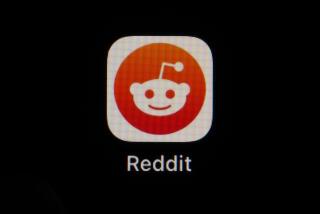NYSE and Nasdaq compete for Facebook listing
- Share via
The New York Stock Exchange and Nasdaq are battling it out far from home — at Facebook Inc.’s Silicon Valley headquarters — to see which market will snag the hottest stock listing in years.
As the social-networking giant prepares for a blockbuster initial public offering expected this spring, a guessing game has emerged over where it will call home. The Nasdaq has lured many other technology companies, while the Big Board has pushed hard in recent years for more tech offerings.
The longtime rivalry between Nasdaq OMX Group Inc. and NYSE Euronext Inc. has reached a new intensity, experts say. They are battling for not just profits but for the cachet that Facebook would bring.
The chief executives at both exchanges are said to have personally appeared at pitch meetings, a rarity that demonstrates the importance they place on Facebook.
“They’re pulling out all the stops,” said Jason Frankl, a stock-listing expert atFTI Consulting Inc.”There is exposure, prestige and multiple revenue streams associated with the Facebook listing.”
Each exchange has claimed some bragging rights in the last year as the two faced off over a string of social-media names. Nasdaq bagged Zynga Inc.and Groupon Inc., while the NYSE secured LinkedIn Corp.,Pandora Media Inc.and Yelp Inc.
Experts say Nasdaq stresses its long track record with tech companies, including Apple Inc., Microsoft Corp.and Google Inc.Its tech-sector prowess stems from the tech boom, when many start-ups favored Nasdaq for its lower fees and easier listing standards. Nasdaq also offers exposure through a seven-story electronic billboard in New York’s Times Square.
The NYSE emphasizes its blue-chip prestige and its effort in recent years to attract tech companies. And, of course, there’s the lure of ringing the opening bell on the Big Board’s storied trading floor.
“The history would go toward Nasdaq, but the trend is toward the NYSE,” said Scott Cutler, who co-heads the exchange’s listings business.
Nonsense, counters Robert McCooey, his Nasdaq counterpart.
“Just because someone climbs to the highest mountain and shouts that they’re the home for technology doesn’t mean they’re the home for technology,” McCooey said. “Just because I could say ‘I’m 6 foot 2 and I look like Brad Pitt’ doesn’t mean it’s true.”
The choice for Facebook may come down to intangibles because factors that appeal to some other companies — such as the aura to be had from listing on one exchange or the other — don’t apply to a social-media juggernaut that claims 845 million worldwide users.
“For a company like them it’s almost an irrelevant decision,” said Diego Perfumo, an analyst at Equity Research Desk in Greenwich, Conn. “They’re already a household name.”
Facebook has given few hints about which way it’s leaning.
The company chose a two-letter ticker symbol, FB, when it filed its IPO paperwork last month.
In the past, that would have signaled an NYSE listing because the Big Board doled out all tickers of one, two or three letters. Meanwhile, the Nasdaq controlled four-letter symbols. That was changed several years ago, and each now can hand out any ticker.
The exchanges are going hard after Facebook in part because the hammerlock they once had on their main businesses lines — stock listings and trading execution — is being eroded by other global exchanges and upstart electronic-trading venues.
The number of companies listed on Nasdaq has slumped to 2,669 today from 5,556 in 1996, according to the World Federation of Exchanges. NYSE listings have fallen to 2,308 from 3,025 in 1999.
And encroachment from electronic competitors with names such as BATS and Direct Edge has siphoned trading volume from both exchanges.
The portion of trading that the NYSE handles in companies listed on its own exchange, for example, has fallen to 29% today from 76% in 2006, according to Equity Research Desk.
The NYSE and Nasdaq have sought to bulk up through acquisitions but with little success thus far.
A Big Board attempt to merge with its German counterpart was scuttled by European regulators. And Nasdaq failed in a hostile bid for the London Stock Exchange, and then the NYSE itself.
Luring Facebook wouldn’t end the challenges but could help the winner attract other companies.
“It may be more of a moral victory than a huge boost to the bottom line,” said Adam Sussman, research director at the Tabb Group. “But a moral victory is better than none.”
More to Read
Inside the business of entertainment
The Wide Shot brings you news, analysis and insights on everything from streaming wars to production — and what it all means for the future.
You may occasionally receive promotional content from the Los Angeles Times.










